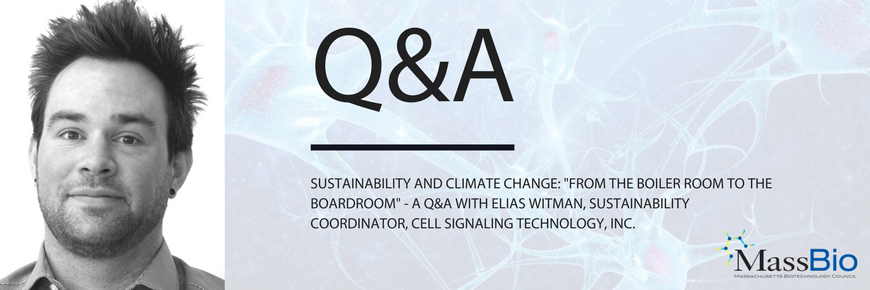What roles do biotech companies play in meeting UN climate change goals?
Many life science companies are making public pledges to meet the Paris UN COP21 climate change goals. These claims are listed on UNFCCC climate portals as well as the USA’s “We’re Are Still In” campaign that is a coalition of thousands of universities, business, and communities that stands behind climate action. Setting and following through on these goals requires interdepartmental coordination with facilities, EHS&S, marketing, and human resources. All carbon dioxide emissions from electricity, heating, transportation, supply chain logistics waste management need to be accounted for in order to fully capture a company’s greenhouse gas (GHG) profile. Modeling on U.S. climate goals under the Obama Administration, and pledges from groups like the World Wildlife Fund, setting a goal of 3% GHG reduction year-over-year is a way that companies large or small, can meet UN climate goals, and make a difference for our planet. Many MassBio member companies are truly raising the bar when it comes to sustainability and corporate social responsibility.
Where are we seeing partnerships between public and private organizations on environmental planning goals?
As many of you may know, Massachusetts is leading the way for public action to combat climate change. In 2008, The Global Warming Solutions Act was signed into law that requires GHG reductions from each sector of the economy. In terms of building code, the City of Cambridge has adopted a “Net Zero Action Plan,” which mandates energy efficiency in new buildings, as well as energy retrofits for older facilities. Celis Brisbin, Deputy Director at the US Green Building Council Massachusetts will explain how architects, construction companies, and facilities managers are working to meet these robust energy efficiency guidelines.
In academia, we are seeing a push from Harvard and MIT increase their commitment to change goals. Harvard aims to be fossil fuel neutral by 2026, and perhaps even fossil fuel free by 2050. Jaclyn Olsen, Associate Director of the office for Sustainability at Harvard University, will speak on behalf of their new fossil fuel targets as well as their formal partnerships with city planners and piloting a “net zero lab” working group.
How can smaller institutions take action?
It’s not just large science companies and universities that are working to reduce their GHG emissions and cut pollution. Smaller firms and startups have taken climate action, and are realizing quick return on investment in their energy savings programs. Key examples include installing LED lighting, HVAC modifications & night setbacks, and supporting alternative energy. Panelists on the April 12th forum will speak directly on building internal and external value for sustainability programs at startups and small firms with a focus on investor and employee perspectives.
Whether you work at a lab bench, manage facilities or EHS, or spend more time in the boardroom, please come out to our one-of-a-kind sustainability forum on April 12th as an early celebration of Earth Day. Register here: https://www.massbio.org/events/sustainability-and-climate-change-from-the-boiler-room-to-the-board-room-2701
About Elias Witman
Elias develops sustainability & CSR strategies for biotech in addition to serving as a co-chair of MassBio’s Safety, Environment, and Facilities working group. He recently returned from the COP23 climate talks, and in 2016, created a plan for Cell Signaling Technology to meet Paris COP21 climate change goals.
